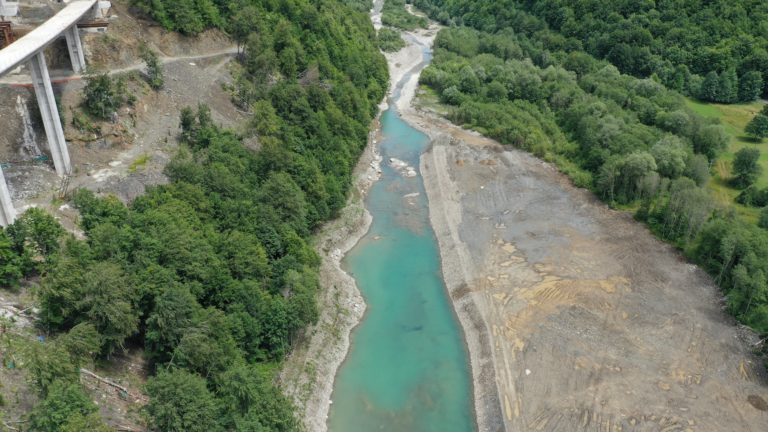CRBC, main contractor for the construction of the Bar – Boljare highway, is suspected of extracting gravel from Tara in June and July this year for the construction of a priority section of the highway, which is why inspectors from the Administration for Inspection Affairs filed a complaint with the Basic State Prosecutor’s Office in Kolašin, as shown by the documentation obtained by the Investigative Centre of the NGO MANS. On the other hand, CRBC then claimed that it had not carried out works in the disputed zone for several months.
Namely, at the beginning of July this year, the chief environmental inspector and the chief water inspector of the Administration for Inspection Affairs, during a regular tour of the terrain near Mateševo where the construction of the highway takes place in or near the Tara riverbed, noticed that at the beginning of the bridge Uvač 3 “deepening of the Tara riverbed in the length of about 100 m took place”, i.e. that illegal exploitation of river gravel was carried out.
In addition, the inspection report states that the deepening was not noticed during their previous field visit on June 4 this year, which is why it is concluded that the gravel from the river was exploited in the meantime. Near the Uvač 3 bridge, inspectors also noticed traces of wheels on the shore, which is protected from the view of passers-by by the forest.
According to the Environmental Impact Assessment Study for the construction of the Bar – Boljare highway, the exploitation of sand and gravel from watercourses near the construction site is possible only with the permission of the competent authorities.
The inspectors state in the minutes that there was no CRBC employees during the supervision, or the representatives of the expert supervision. Due to all the above, CRBC, the main contractor on the construction site, was asked to state its position regarding the observed irregularities in writing.
CRBC’s statement, submitted to the inspection less than a month later, states that no works have been carried out in the disputed zone for several months, and that all material for the project – crushed stone of smaller granulation, is procured from the company “Bemax” from another location, within section 3 of the highway.
The Law on Spatial Planning and Construction of Structures clearly prescribes the obligation to secure the construction site in such a way that it must be closed and secured to enable unhindered traffic flow, safety of persons, adjacent facilities and the environment. In case of non-fulfilment of this legal obligation, a fine in the amount between € 5,000 and 40,000 is prescribed.
The mentioned statement, which the inspectors found imprecise and cursory, was submitted to the Basic State Prosecutor’s Office in Kolašin at the end of July this year, with evidence that it was a devastation of watercourses of national importance.
Response of the Basic State Prosecutor’s Office in Kolašin to questions of the MANS Investigative Centre regarding the status of the report – what has been done so far and what measures have been taken, as well as whether an indictment has been filed, was that the inquest procedure was ongoing.
Lazar Grdinić
In 2017, the Ministry of Agriculture and Rural Development banned further exploitation of gravel and sand from riverbeds. As it was explained at the time, the moratorium was introduced due to the expiration of concession agreements, illegal exploitation, as well as also due to the fact that there were no watercourse regulation projects at that time. However, precisely under the guise of regulation, construction companies in Montenegro continued to extract gravel from rivers without let or hindrance.
So far, competent authorities have justified all the activities of CRBC that had direct impact on the watercourse of the Tara River by the so-called project of regulation of its riverbed. Namely, CRBC has been disposing material created by drilling of tunnels on the route on the banks of the Tara for years, justifying it by the necessity of regulating the river, while avoiding taking it to the locations intended for that. Warnings from environmental activists, NGO sector and international institutions that disposing waste in the riverbed itself will cause irreparable damage to the river have so far not yielded results in the form of an adequate response from the competent authorities.





